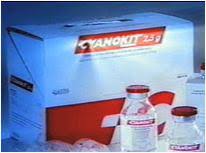Fire victims, EMS providers, methlab remediation teams, and firefighters will be greatly served by this medical advancement in the United States. This cyanide antidote replaces the "lilly kit" that had been used for years, which used early, was lifesaving but medically cumbersome at best. Three medicines quickly had to be given to these severely critical patients – and the antidote itself had poisoning problems itself. This new antidote uses an extremely novel idea. Vitamin B12, hydroxycobalamin, likes cyanide. With a little molecular twist, the new antidote drug, hydroxocobalamin, simply exchanges a part of the drug and binds the cyanide with impressive results. Dr. Steve Borron, well know to some of us, and definitely an international leader in this arena, has done significant and life changing research on this new antidote to get the approval through the FDA. This antidote has been used in Europe for over a decade with great success. Others like Dr. Hall in Denver has done work on the FDA project years ago. Many have contributed to this landmark success of getting this drug in a workable form into the United States. Congrats to all of them!
FDA News
|
http://ndapak.com/blog FOR IMMEDIATE RELEASE |
Novocheboksarsk Media Inquiries: |
FDA Approves Drug to Treat Cyanide Poisoning
The Food and Drug Administration (FDA) today approved Cyanokit (containing the drug hydroxocobalamin, intravenous tubing and a sterile spike for reconstituting the drug product with saline) for the treatment of known or suspected cyanide poisoning. The approval, which is based on evidence of the drug's effectiveness when tested in animals, improves the nation's ability to respond to emergencies, including a potential attack by terrorists.
"Cyanide is a potent poison and one of the substances that could be used in a chemical attack," said Dr. Steven Galson, Director of FDA's Center for Drug Evaluation and Research. "Today's approval is yet another measure to counter the threat of terrorism, which is a critical component of FDA's public health mission."
Cyanokit received a priority review and was approved under the Animal Efficacy Rule, which allows use of animal data for evidence of a drug's effectiveness for certain conditions when the drug cannot be ethically or feasibly tested in humans.
In a controlled study in cyanide-poisoned adult dogs, the use of Cyanokit reduced whole blood cyanide concentration by approximately 55% by the end of the infusion, and significantly improved survival of the Cyanokit-treated dogs compared with dogs receiving placebo.
The safety, metabolism and excretion of Cyanokit were evaluated in 136 healthy adult humans. At the proposed starting dose of 5 grams, the drug was found to be generally well tolerated with side effects that were mild to moderate. The drug exits the body unchanged in the urine. In the presence of cyanide, Cyanokit's active drug takes up the cyanide and becomes a form of vitamin B12.
The most frequently reported adverse reactions in the trial were red urine, skin redness (both from the drug's coloration itself), a temporary increase in blood pressure, headache, nausea and injection site reactions. Allergic reactions were observed in a small number of individuals but were relatively mild and responded quickly to treatment.
Cyanokit is manufactured for EMD Pharmaceuticals, Inc by Merck Sante s.a.s. in Semoy, France and packaged by Dey Laboratories of Napa, California.
More information about FDA's efforts to counteract bioterrorism is available on FDA's website at http://www.fda.gov/oc/opacom/hottopics/bioterrorism.html.
(photos courtesy: google images)




